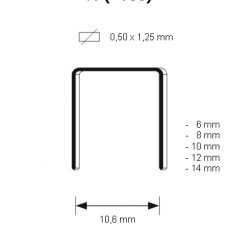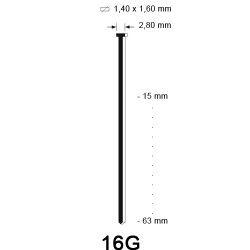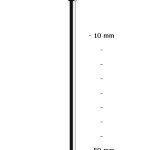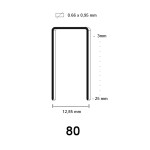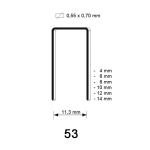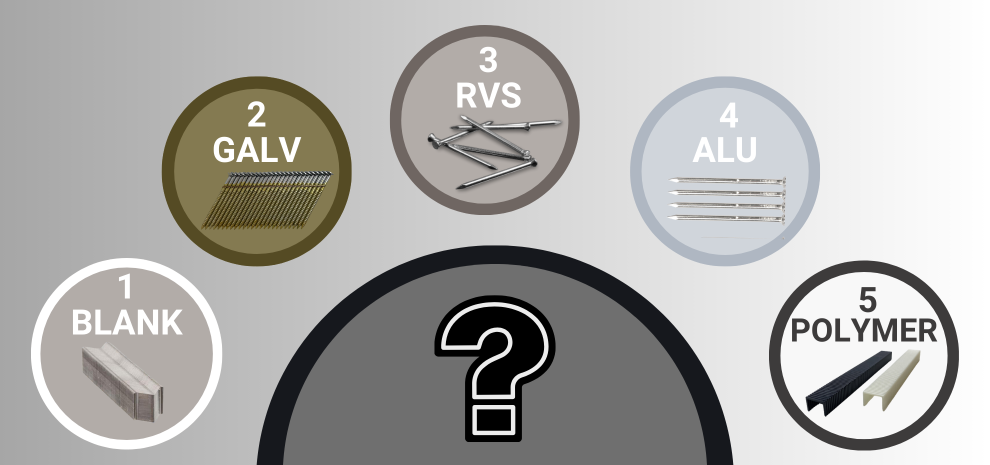
Een klus valt of staat bij het kiezen van goed bevestigingsmateriaal. Let naast de vorm en lengte van het bevestigingsmateriaal ook goed op waarvan het is gemaakt. Elk type materiaal heeft namelijk z’n eigen eigenschappen, wat impact heeft op de sterkte, maar ook de duurzaamheid van jouw project.
In deze blog vertellen we je de verschillende eigenschappen van de materialen, waardoor je alle kennis bezit om een weloverwogen keuze te maken.
Verschillende type materiaal
Bevestigingsmaterialen komen in veel verschillende materialen. We bespreken de meest voorkomende materialen en hun eigenschappen. Dit zijn bevestigingsmaterialen gemaakt van:
- Blank staal
- Gegalvaniseerd staal
- Roestvast staal (RVS)
- Aluminium
- Polymer
Let op: Niet elke tacker kan elk type materiaal schieten. Het stevig bevestigen van polymer bevestigingsmateriaal vraagt om tackers met een krapper magazijn, waardoor er minder kans is op het breken van het materiaal. Lees daarom altijd goed de productomschrijving en/of de producthandleiding. Kom je er niet uit? Je mag natuurlijk ook voor advies altijd bellen met onze specialisten.
Bevestigingsmaterialen van blank staal
Voor situaties waar het materiaal niet in contact komt met vocht, maar stevigheid wel belangrijk is kunnen bevestigingsmaterialen van blank staal gebruikt worden. Het grote voordeel van blank staal is dat het goedkoop is. Daarentegen is het beschermt tegen vocht en zal het dus snel gaan roesten. Wanneer dit gebeurd kunnen er ook roeststrepen op het materiaal zichtbaar zijn.
Gegalvaniseerde bevestigingsmaterialen
Bij het galvaniseren van staal wordt de oppervlakte van staal voorzien van een laag zink met behulp van elektriciteit. Dit beschermt het bevestigingsmateriaal beter tegen roest. Gegalvaniseerd staal staat bekend om zijn goede prijs-kwaliteitverhouding. Voor klussen in het interieur is gegalvaniseerd staal een prima keuze.
Bevestigingsmateriaal van roestvast staal
Komt je bevestigingsmateriaal in contact met water, dan is het verstandig om te kiezen voor roestvast staal (RVS). Zeker wanneer de toepassing voor buiten is, wordt er vaak gekozen voor roestvast staal.
RVS bevestigingsmateriaal is duurder dan bevestigingsmateriaal van gegalvaniseerd staal. Dit komt voornamelijk door het hoge nikkelgehalte.
Er zijn 2 hoofdtypes RVS, namelijk RVS van A2 kwaliteit en RVS van A4 kwaliteit. Bij BestFix verkopen we voornamelijk roestvast stalen bevestigingsmaterialen van A2 kwaliteit. Heb je een klus waarvoor je RVS type A2 nodig hebt? Neem dan contact met ons op om de mogelijkheden door te nemen.
RVS type A2
Dit type roestvast staal komt het meest voor. Bevestigingsmateriaal van dit type rvs zal geschikt zijn voor standaard gebruik in een buitenomgeving in een mild klimaat.
RVS type A4
Dit type rvs komt minder vaak voor aangezien het duurder is. Toch wordt er in sommige gevallen gekozen voor RVS A4 omdat het geschikt is extreme omstandigheden. Denk hierbij bijvoorbeeld aan een buitenomgeving aan de zee kust of het gebruik van het bevestigingsmateriaal in of bij een zwembad met chloor.
Aluminium bevestigingsmateriaal
Een alternatief voor stalen bevestigingsmaterialen zijn aluminium bevestigingsmaterialen. Aluminium bevestigingsmateriaal is licht en roest niet. Daarnaast heeft het een zachtere legering, wat het makkelijker maakt om het achteraf te verwijderen.
Aangezien het zachter is, kun je er makkelijker doorheen frezen. Dit maakt het ook meteen minder geschikt voor bouwconstructies. Daarnaast is het ook een wat duurder materiaal.
Polymer bevestigingsmateriaal
Tot slot zijn er ook bevestigingsmaterialen gemaakt van kunststof (polymer). Kunststof bevestigingsmaterialen kunnen geschuurd, gevormd en gesneden worden zonder dat het boorbitjes, zaagbladen, schaven of schuurbanden beschadigd. Dit maakt ze populair om CNC-materiaal op z’n plek te houden.
Daarnaast ben je bij polymer bevestigingsmateriaal ook verzekerd dat het nooit zal roesten of vlekken. Ook is het niet magnetisch, wat bij sommige toepassingen belangrijk is.
Als laatste is de uittrekwaarde van polymer bevestigingsmateriaal ook hoger. Echter heeft bevestigingsmateriaal als nadeel dat de schuifsterkte half zo goed is als metalen bevestigingsmaterialen. Om die reden zijn polymer bevestigingsmaterialen niet geschikt voor structurele toepassingen.
Interesse in kunststof bevestigingsmaterialen? Ons assortiment polymer bevestigingsmateriaal kun je vinden op onze gespecialiseerde webshop www.polymerfasteners.com.
Hulp bij het kiezen van bevestigingsmateriaal?
Ben je na deze blog er nog niet helemaal uit welk type materiaal voor jouw klus het best zal zijn? Onze specialisten staan voor je klaar. Neem contact met ons op, dan helpen we je graag verder.




